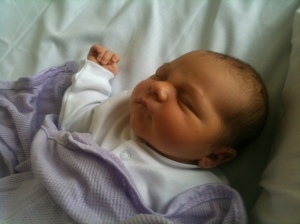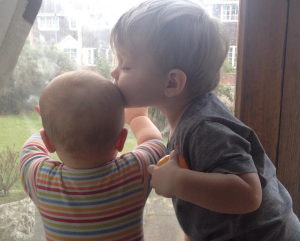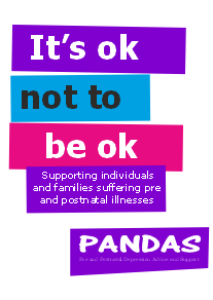Pregnancy. Labour. Motherhood. Every word fills you with hopes, dreams and expectations of what your experience is going to be like. When plans go off the rails in a spectacular fashion, it will be a challenge ensuring that you don’t too.
November 13th 2013, the day that changed mine and my partners lives forever when we found out that we were expecting our first child. Like every Mummy and Daddy we were a mixture of excitement and terror all rolled into one! We stocked up on pregnancy books, vitamins and started thinking about baby names. But that all changed at 8 weeks pregnant…
I began bleeding heavily. Suddenly the questions of “would we have a boy or a girl/who would they look like”, were replaced with “was I miscarrying/was our baby going to survive?”. The hospital thought I had a uterine abnormality, which would subsequently significantly raise the chance of miscarriage, late miscarriage, still birth and premature birth. From that moment on, the fun and excitement of pregnancy was snatched away and would never come back…and was replaced with anxiety and fear. I will forever be bitter about that.
The pregnancy progressed slowly but surely, and it seemed that every appointment threw up another problem and worry to contend with. At 20 weeks I was diagnosed with hydroenpherosis , swelling of the kidneys. And at 26 weeks we were told that our baby was significantly smaller than he should be, and wasn’t even reading on the chart. Growth scans were arranged and we just hoped and prayed that our little one would grow bigger and stronger as time went on.
15th May 2014. At 29+6 weeks pregnant, our little man went quiet. I didn’t feel a single kick or movement for over 12 hours. I found myself in denial…he would be fine in another hour. The hours ticked by and by 11pm my partner was urging me to get checked out. So off to the hospital we went.
We can’t have been there any more than an hour and it soon became apparent that this was an emergency. Our little man’s heart rate was ominous, slowing down to virtually nothing, he had reduced liquor and was diagnosed as having IUGR. He was dying inside of me. We were rushed to theatre, where I was to have an emergency caesarean.
May 16th, at 1.49am our gorgeous little boy entered the world. I felt numb. This wasn’t how we had dreamt it. Daddy didn’t cut the cord, Mummy didn’t get first cuddles and first nurse. Instead we had the haunting silence. Our son was being rescuscitated. In those moments I prayed harder than I ever had in my life, to Jesus, Allah, Buddha…anyone who would listen to me. Our boy just couldn’t die.
After what felt like an eternity, we were able to have a glimpse of our little boy before he was whisked away to the Neonatal Intensive Care Unit (NICU). I was a broken woman. One moment I was pregnant and the next I had my baby ripped away from me, along with all of our hopes and dreams of our perfect delivery. I couldn’t keep him safe anymore, like his Mummy should be able to do.
I was taken to a ward full of mothers and their babies. All around me I watched as mothers nursed their little ones, when all I had was a breast pump- which I would chain myself to for the next four months. I felt as though others were looking at me, and judging…”what has she done wrong”. My arms were physically aching to hold our son, knowing that instead he was curled up in a little box all frightened and alone without his Mummy. I cried until I had no tears left.

12 hours later we were able to see and hold our son properly for the first time in his life. My reaction shocked me to the core. All the bleeps and whistles, the heat from the incubators, the blue lights from the UV machines…it was overwhelming. I looked at our tiny 2lb 15oz son, tracking all the wires and tubes coming in and out of his fragile little body. His chest heaving for breath, his little face wincing in pain.
As the nurse placed our son on my chest I was petrified. My hand was the size of his tiny little torso, his eyes were almost fused shut. He should have still been inside of his Mummy, all safe and warm. What if he hated me? Or worse…what if he didn’t even know I was his Mummy anymore? I felt like I had failed before I had even begun, and that our Mother-Son bond was shattered beyond repair.
Looking back now, I know that subconsciously I was scared of becoming too close to our son out of fear of losing him in the early days. But at the time I felt like a monster. I felt like running away, pretending that none of this was happening , starting all over again…and this time I would do it right. I wanted to curl up in bed and shut out the world.
All I could do for our son was express breast milk for him, so I did this up to 10 times a day. It was the only thing that I could do that made me feel like a Mummy. Seeing doctors and nurses changing him, feeding him, looking after him, knocked my confidence as a mother. How was I supposed to be good enough to do all of these things? I had to ask permission to hold my own son.
It quickly became clear that I wasn’t coping at all. I was sad, I was angry, I was in denial…All in the same day most of the time. I looked at other families in envy of what they had. Walking out of the hospital doors with their babies, whilst we were camped out next to his incubator day after day. I dreaded going into that unit, it made me sick to my stomach just being there. I avoided holding my son, doing his cares and spent most of my time crying in the toilets.
Leaving our son every single night in that hospital full of strangers, has broken a piece of my heart to the point where it will never be the same again. Every night without fail I would hysterically break down in the car park, and felt physically ill thinking about him being all alone in pain wanting his Mummy and Daddy.
At home I would hear the sound of the monitors beeping and buzzing, I felt constantly on edge and unable to relax at all. I would lie in bed clutching my phone, petrified whenever the phone rang in case it was bad news.
My emotional heartbreak was also masking some serious physical problems I was experiencing post birth. With a dangerously high temperature and pulse I was rushed back into hospital, where I was diagnosed with a septic womb infection. If it had gone untreated for much longer I was told I would have experienced multiple organ failure. Another kick in the teeth for our family.
I had always suffered with low confidence for all of my life, but having an extremely premature baby rocked me to the core. After 7 long weeks our son was finally able to come home with us, and I thought that things would finally begin to get back to normal. With all of the free time now on my hands as a full time Mum, I began to process the enormity of what we had all been through as a family. How close we had come to losing him.
I knew almost straight away that things weren’t going to be as easy as I had hoped. I was constantly feeling sick with anxiety, having severe headaches, heart palpitations and was constantly sick with worry that our son was ill and that we could still lose him.
I was having horrible flashbacks and nightmares, and was constantly consumed and tortured by all of the what ifs? What if we hadn’t gone into hospital that night? Motherhood wasn’t all sunshine and rainbows, all smiles and giggles like I thought it would be. I was hurting.
With the support of my partner, I sought help from my health visitor and GP. It was a massive step. As a new mother, like most, I had the pre conception that asking for help and admitting your struggling was a sign of weakness. That it made me a bad Mum. But now I know that it made me the best Mum I could be. My son, and my partner, deserved the best Mum and Fiancee possible, and at the time that was far from who I was.
I was referred for cognitive behavioural therapy, where I could talk through my thoughts and concerns with someone who wouldn’t judge me, and someone who would sympathise and understand. I kept a thought diary, a no holds barred account of my everyday life. I was diagnosed with post natal anxiety, low confidence and post traumatic stress disorder. It was by no means a quick fix, but was a massive step in the right direction.
Almost 10 months on from the birth of our son, I feel like pieces of the old me are coming back. I am by no means back to the old me, but I am slowly and surely accepting what happened to us all. I am now at peace with the premature arrival of our son, and accept that it was not as a result of a fault on my part. But, a piece of my heart will be broken forever at what we had to witness our son going through.
Worries about our Mother-Son have totally vanished. Our son is my little shadow, and he lights up my life every single day. I am so lucky that I had the inner strength and courage, and the support of my partner to seek help to ensure that I was the Mum that he deserved.
Motherhood is definitely not what I expected it to be. It is a massive rollercoaster, that I don’t think will ever end. If you are struggling, please speak out and seek help. No one will judge or think badly of you. Take time to heal, and regardless of what I once thought, super Mum just doesn’t exist and that’s ok. It is ok not to be ok.






